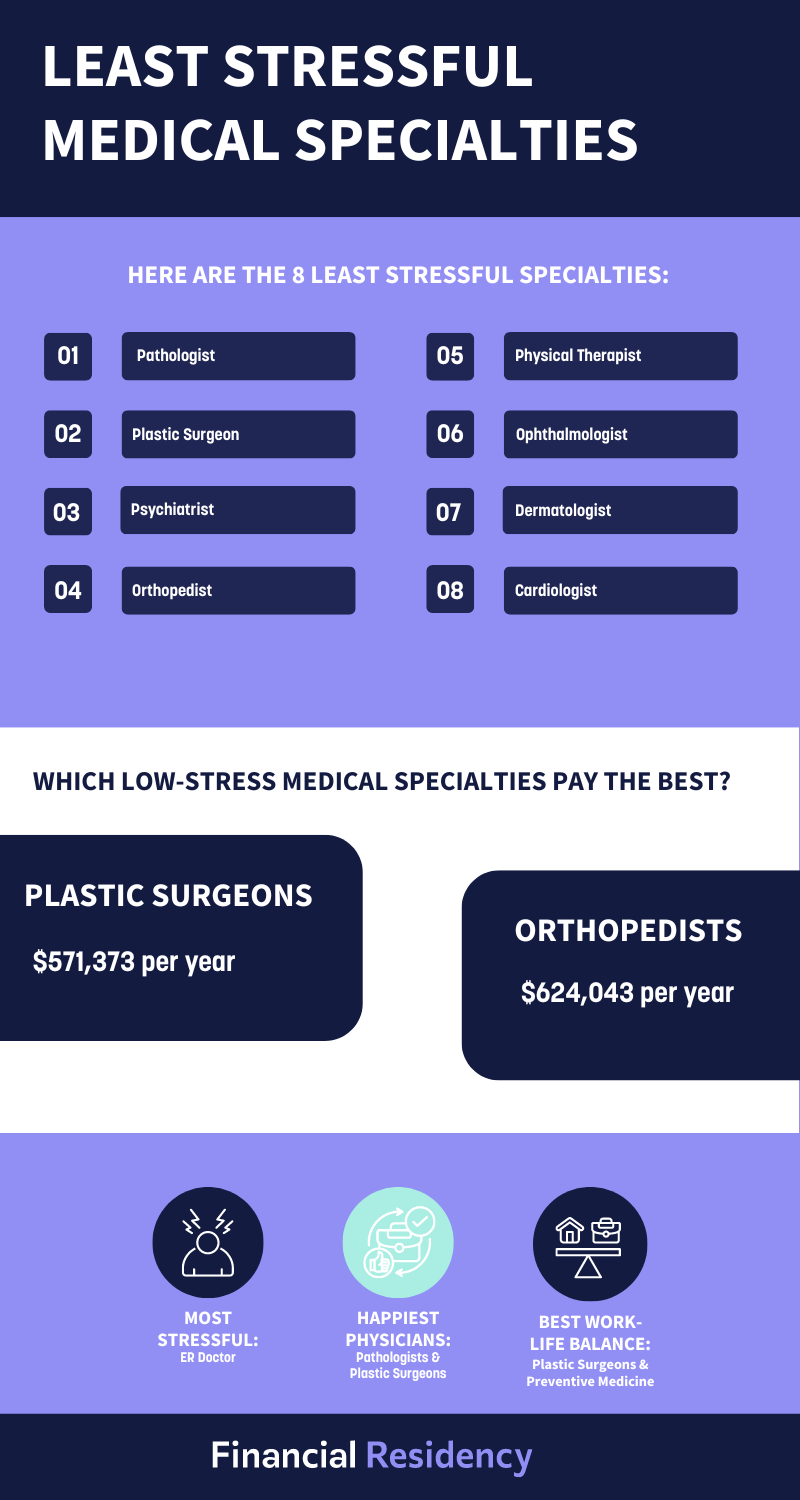Many jobs are stressful, especially those in the medical field. Medical professionals have the lives and well-being of their patients in their hands, naturally making any specialty somewhat stressful, not to mention the long hours, regulations, and the challenge of dealing with difficult patients.
Below, we’ve listed the least stressful medical specialties based on specialties with the lowest burnout and depression rates among men and women.
8 Least Stressful Medical Specialties
Here are the least stressful medical specialties and what you can expect from working in each field.
- Pathologist
- Plastic Surgery
- Psychiatrist
- Orthopedic
- Physical Therapist
- Ophthalmology
- Dermatology
- Cardiologist

1. Pathologist
According to Medscape’s Physician Compensation Report, pathologists make $339,000 annually and typically work a 9 to 5 schedule. They aren’t on call and don’t work weekends. The exception is if you work in a research setting, you may have more intense hours.
Pathologists have the lowest level of burnout/depression in their jobs, with 55% happy at their jobs. This is probably due to the high salary and controllable work hours.
2. Plastic Surgery
Plastic surgeons are among the highest paid, with an average salary of $619,000. This may contribute to the low burnout and depression rate plastic surgeons experience, with 50% claiming they are content in their jobs. Lower-paid professions have higher levels of burnout and depression.
Plastic surgeons can often set their own office hours, working around their lifestyles and living the way they desire while earning a great living.
3. Psychiatrist
Psychiatrists have a demanding job, but they often have the most limited hours, too. They are rarely on call and typically have minimized hours, allowing psychiatrists to have a great work-life balance while earning an average salary of $309,000 annually.
Fifty percent of psychiatrists in the Medscape survey state they are neither burnt out nor depressed. This could also have to do with the fact that psychiatry is one of the few professions that can remain virtual if needed or desired.
4. Orthopedic
Orthopedics often work demanding schedules due to their work with emergencies; however, because they don’t deal with life-or-death situations, they have a solid happiness level within their profession, with 48% of orthopedics claiming happiness in their profession.
5. Physical Therapist
Physical therapists, like orthopedic doctors, could work long hours but don’t deal with life-or-death situations. Most physical therapists set their own hours and typically only work Monday to Friday.
They don’t have to worry about being on-call and helping people better their lives rather than delivering bad news, which can help with the lower depression rates. Forty-nine percent of physiatrists claim they don’t experience burnout or depression.
6. Ophthalmology
Ophthalmologists make an average of $388,000 annually, and 48% claim they have no issues with depression or burnout. Like others on the least stressful medical specialties list, ophthalmologists work limited hours and are never on call.
Ophthalmologists often have a varied work day, with their time split between seeing patients in the office and performing surgery during regular business hours.
7. Dermatology
Dermatologists help patients with skin issues and often have set office hours. Even those who work as surgeons within the dermatology field don’t work emergency hours and typically are not on call.
65% of dermatologists claim they have no effects from burnout, and 62% state their lives outside work are happy.
8. Cardiologist
Surprisingly, cardiologists tie the happiness rate with dermatologists, but it likely has something to do with their high salaries. Cardiologists are the third highest-paid medical profession, which makes up for the grueling hours and stress cardiologists experience.
Cardiologists had the highest stress levels during the pandemic, and many left their profession during that time. While their happiness outside of work has dropped from 82% to 56% pre and post-pandemic, the burnout level is still better than average.
What Is the Most Stressful Medical Specialty?
You probably guessed the most stressful medical specialty is an ER doctor.
These doctors work long shifts and deal with a lot of violence, infectious diseases, and death throughout their days. Besides surgeons, ER doctors also have one of the highest litigation risks.
Which Low-Stress Medical Specialties Pay the Best?
Plastic surgeons and orthopedic doctors are among the highest-paid, least stressful medical specialties. Cardiology, dermatology, and ophthalmology are the next highest-paid medical specialties. Don’t be fooled, though; many doctors still have financial struggles, no matter how much they make.
While salary is a big factor, it shouldn’t be the only factor when deciding which medical specialty is right for you. A work-life balance, stress on the job, and other factors you can or can’t handle should play a role in the profession you choose.
Frequently Asked Questions
To help in your search for the right profession, here are more questions about medical specialties and stress.
Which Medical Specialty Is the Happiest?
At work, pathologists and plastic surgeons are the happiest specialties, likely because of their controllable schedules and lack of on-call shifts. This does not take into consideration the salaries any of the professions earn.
What Medical Specialty Provides the Best Work-Life Balance?
Plastic surgeons and preventative medicine doctors have the best work-life balance because they control their schedules and typically work 9 to 5 hours regularly.
Which of These Low-Stress Medical Specialties Is the Easiest To Become?
All of the low-stress medical specialties on this list are doctors, so they require at least four years of undergraduate study, four years of medical school, and 3+ years of residency. Each profession has different residency and course load requirements that vary by college and location.
What Medical Specialties Work the Least Hours?
The medical specialties with typical 9-to-5 office hours work the least. This includes plastic surgeons, pathologists, ophthalmologists, and psychiatrists.
Final Thoughts
Finding the least stressful medical specialties is an important part of choosing a medical profession, but look at other factors, too. You want your money and time invested in medical school to pay off and allow you to live the life you’ve always wanted. Stress is a big factor, but it also depends on where you work, the practice you choose, and the level of involvement you have in your practice.




